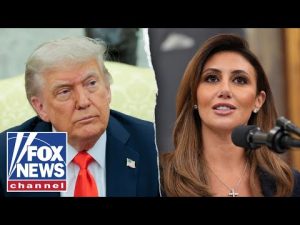**A Bold Move: America’s New Ambassador to Thailand Takes a Stand**
In a world often tangled in diplomatic webbing, one individual has decided to cut through the noise. The newly appointed U.S. ambassador to Thailand has made headlines by boldly addressing allegations of human rights abuses in Thailand. He has called on President Trump to intervene and return 18 American soldiers stationed there. This unexpected and spirited move has got the political talking heads buzzing and the social media world ablaze.
Usually, ambassadors are constrained by protocol and are not permitted to make public statements before formally taking up their roles. However, this ambassador seems to think outside the bureaucratic box. He has written a letter denouncing the alleged crimes against humanity committed by the Thai government and urged a review of the ongoing tariff war with Thailand. The bravado of this action has many excited, as it signals a new direction in U.S. foreign policy that prioritizes moral integrity over political niceties.
While the ambassador’s bold move may seem like a solo act of defiance, it has rippling implications throughout Southeast Asia. The increasing instability in Thailand could affect its neighbors, with neighboring Myanmar already ramping up military presence in anticipation of any fallout. Reports indicate that they’ve shut down border crossings, bringing the national military to attention. This swift reaction shows that even neighboring nations are on high alert as tensions rise over Thailand’s political landscape.
But why the sudden anxiety? It appears that behind the scenes, the tension is radiating from a power struggle that could resemble a new coup—a disheartening trend in Thailand’s recent history. The nation has witnessed 16 coups in the last 25 years, and many analysts believe this current situation might herald the 17th. As Thai generals jockey for power, it’s not just the Thai people who should be concerned—regional security dynamics are in play, with countries like Vietnam cautiously watching from the sidelines.
As if things couldn’t get any murkier, the ambassador’s statements have stirred speculation about China’s increasing influence in the region. The Thai government has hinted at leaning on Chinese military technology instead of U.S.-made equipment. Analysts suggest that China could be using Thailand as a pawn in its geopolitical chess game, maybe testing President Trump’s resolve. This brings a whole new layer of unpredictability to an already complex situation. If Thailand continues its descent into chaos, observers worry that we might soon face serious ramifications.
Amidst this backdrop of geopolitical tension, there’s something else brewing. A recent movement among Buddhist monks in Cambodia has caught the world’s attention as they openly praised Trump, claiming his leadership is divinely inspired. This swell of support underscores the importance of moral leadership in international relations. As ambassadors and leaders navigate these tumultuous waters, the call for integrity and righteousness remains a clarion call echoed both by the faithful in Cambodia and by those who seek a stable global order.
In a landscape filled with uncertainty, the actions of our new ambassador are a timely reminder that standing up for principles can resonate beyond borders. It’s a hopeful sign that some leaders are willing to take risks for the greater good. As conversations about tariffs and diplomatic relations unfold, the world is watching closely, and the stakes have never been higher. The question remains: will Thailand heed the warnings and change course, or are they on a path towards further turmoil? The answer could very well shape the future of this critical region and our relationship with it. So, as they say, stay tuned—this may just be the beginning.







